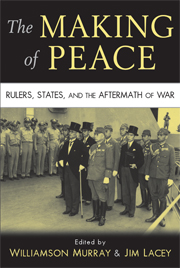Book contents
- Frontmatter
- Contents
- Preface: concluding peace
- 1 Introduction: searching for peace
- 2 The Peace of Nicias
- 3 “A swift and sure peace”: the Congress of Westphalia 1643–1648
- 4 The Peace of Paris, 1763
- 5 In search of military repose: the Congress of Vienna and the making of peace
- 6 War and peace in the post–Civil War South
- 7 Vae victoribus: Bismarck's quest for peace in the Franco-Prussian War, 1870–1871
- 8 Versailles: the peace without a chance
- 9 “Building buffers and filling vacuums”: Great Britain and the Middle East, 1914–1922
- 10 Mission improbable, fear, culture, and interest: peace making, 1943–1949
- 11 The economic making of peace
- 12 Ending the Cold War
- 13 Conclusion: history and the making of peace
- Index
- References
1 - Introduction: searching for peace
Published online by Cambridge University Press: 05 June 2012
- Frontmatter
- Contents
- Preface: concluding peace
- 1 Introduction: searching for peace
- 2 The Peace of Nicias
- 3 “A swift and sure peace”: the Congress of Westphalia 1643–1648
- 4 The Peace of Paris, 1763
- 5 In search of military repose: the Congress of Vienna and the making of peace
- 6 War and peace in the post–Civil War South
- 7 Vae victoribus: Bismarck's quest for peace in the Franco-Prussian War, 1870–1871
- 8 Versailles: the peace without a chance
- 9 “Building buffers and filling vacuums”: Great Britain and the Middle East, 1914–1922
- 10 Mission improbable, fear, culture, and interest: peace making, 1943–1949
- 11 The economic making of peace
- 12 Ending the Cold War
- 13 Conclusion: history and the making of peace
- Index
- References
Summary
War appears to be as old as mankind, but peace is a modern invention.
The earliest of historians, Herodotus and Thucydides, provided Greek and Western thinkers with the first efforts to record, examine, and analyze human events. As the latter explicitly stated at the beginning of his history of the Peloponnesian War, “It will be enough for me…if these words of mine are judged useful by those who want to understand clearly the events which happened in the past and which (human nature being what it is) will at some time or other and in much the same ways, be repeated in the future.” Herodotus and Thucydides were indeed the “fathers of history” and, like so many who have followed in their footsteps, their histories focused on war – specifically, the origins and course of the two great wars that buffeted the world of fifth-century B.C. Greece. The first involved the epic struggle of the Greek city-states against the Persian Empire (490–479 B.C.); the second, the terrible, debilitating Peloponnesian War between the alliances of Greek city-states led by Athens and Sparta (431–404 B.C.).
Yet, neither historian involved himself much in discussing the peace making that came afterwards, for reasons which in retrospect are understandable: Herodotus, perhaps because the struggle against the Persians continued well after the defeat of the Persian Army at Plataea in 479 B.C.; Thucydides, because death robbed him of the opportunity to complete his history of the Peloponnesian War.
Information
- Type
- Chapter
- Information
- The Making of PeaceRulers, States, and the Aftermath of War, pp. 1 - 29Publisher: Cambridge University PressPrint publication year: 2008
